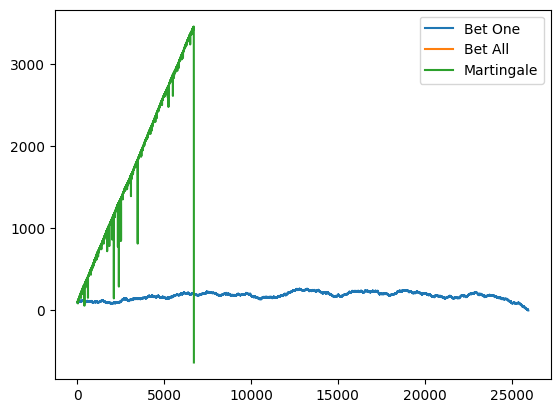- Martingale is like this..If you go to roulette. You're looking to make 1 dollar.
- You bet one on black, then you win! You accomplish your goal of making one dollar.
- However. If you lose, you rebet 2 dollars on black, if you lose you bet 4 dollars.
- You keep doubling your bet until you win. With inifnite money, you will never lose, the limit of your probility losing goes to 0.
- The caveat lies in having infinite money, no one has infinite money so the probability is non zero.
- But the mind wants to believe that that probabilty non zero is a lot smaller than what it actually is.
- AS described from my coin flip experiment, it's actually more likely for that small chance to happen given a large amount of trials.
PythonNotebook
- Based on my graph, yes you definitely lose. It's just the fact that it takes some time. Is there a statistical way to withdraw before that happens?
- I'm not sure how easy that is to do. There has to be some math involving the complement. IE: quit before N losses so that your probability of winning is over P.
- In other words. How many games must you play so that your probability of NOT LOSING is above 80% for example. I am a risk averse person (generally), so I would say that 80% is a good amount.
- However, the risk is also relative to the amount gained. If I realize that that answer is 5 dollars for instance, I am willing to risk more to gain more.
- This is more of a psychological problem because I need to calculate my own curve (non-linear thinking) of what percentage I'm willing to have NOT LOSING versus the amount of money I would like to gain
- And then plot that against the martingale curve. And see where it intersects..
- This is so confusing..
Part2

